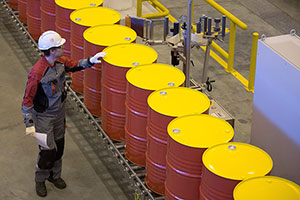Crude Oil Rises Above $40 in New York for First Time in 3 Months

Oil surged above $40 a barrel in New York for the first time since December as central banks from the United States to Norway signaled they will continue to provide economic stimulus to support demand.
The Bloomberg Dollar Spot Index fell a second day after the Federal Reserve scaled back expectations for the pace of interest-rate gains. A weaker dollar bolsters investor demand for commodities priced in the currency. U.S. crude output slid to the lowest level since November 2014 and supplies expanded by 1.32 million barrels, the smallest gain in five weeks, according to an Energy Information Administration report March 16.
"It’s primarily a dollar story right now," said Bill O’Grady, chief market strategist at Confluence Investment Management in St. Louis, which oversees $3.4 billion. "The weak dollar is bullish for all commodities, especially oil."
West Texas Intermediate oil has surged 54% from a 12-year low touched last month on speculation a global surplus will ease. American shale output is falling, and some of the world’s biggest producers, including Saudi Arabia and Russia, are pledging not to raise their production.
WTI for April delivery rose $1.74, or 4.5%, to settle at $40.20 a barrel March 17 on the New York Mercantile Exchange. It is the highest settlement since Dec. 3. Total volume traded was 19% above the 100-day average at 2:44 p.m.
Brent for May settlement climbed $1.21, or 3%, to $41.54 a barrel on the London-based ICE Futures Europe exchange. Futures ended the session at the highest level since Dec. 4. The global benchmark crude closed at a 12-cent discount to May WTI.
"Reaching $40 gets a lot of attention because it’s a nice round number," said Rob Haworth, a senior investment strategist in Seattle at U.S. Bank Wealth Management, which oversees $128 billion of assets. "The $30 and $50 levels are more important in terms of investment decisions."
The Fed’s March 16 decision to set a higher bar for when it may raise rates again also bolstered U.S. equities, which erased their losses for the year. The Standard & Poor’s 500 Oil & Gas Exploration and Production Index climbed as much as 2.8%.
The Bloomberg Commodity Index, a gauge of 22 raw materials, increased as much as 2.2% to the highest level since Dec. 7. Zinc, silver and WTI had the biggest gains on the index.
"This is a strong rally, and the main catalyst is the return of easy money," said John Kilduff, a partner at Again Capital, a New York-based hedge fund that focuses on energy. "The Fed announcement March 16 was the latest sign that central banks are going to continue with stimulus. This is putting downward pressure on the dollar, which favors commodities."
U.S. production dropped by 10,000 barrels a day to 9.07 million, according to an EIA report March 16. Stockpiles at Cushing, Oklahoma, the delivery point for WTI, increased by 545,000 barrels to a record while nationwide supplies rose to the highest level in more than eight decades.
Some producers from the Organization of Petroleum Exporting Countries and outside the group are finalizing plans for a meeting in Doha on April 17 to discuss freezing output, according to Qatar’s energy minister.
Oil production freeze proposal news:
• Saudi Arabia will join the meeting in Doha next month, according to Oil Minister Ali Al-Naimi.
• The market may stabilize within six to nine months if a deal is reached in Doha, Russia’s Energy Minister Alexander Novak said in Moscow.
• Saudi Arabia, Russia, Qatar and Venezuela agreed last month they would freeze output, if other producers followed suit, to tackle a global oversupply in the oil market.




